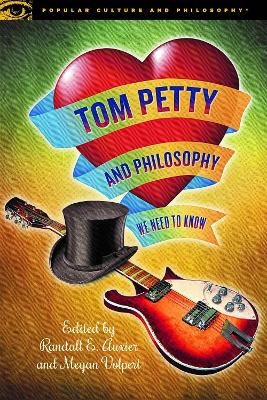
Tom Petty and Philosophy
Open Court Publishing Co ,U.S. (Verlag)
978-0-8126-9465-9 (ISBN)
"Seventeen curious, well-tuned writers (they’re fans, too) turn their philosophical attention to Tom Petty in this intellectually rigorous and wildly fun ‘little box set of big ideas’. In his hits, deep cuts, and videos they find complexity, ideas, and plenty of questions—plus some answers—about the human condition. I need to know, Petty once sang. These writers are really listening.”
—JOE BONOMO, author of Field Recordings from the Inside (2017) and editor of Conversations with Greil Marcus (2012)
“A great song has worlds inside of it. And Tom Petty wrote a lot of them. But too often we don’t stop to explore, question, consider, knock on a few of the doors that appear down a great song’s corridors. In this collection, some thoughtful writers have come together to show us how they did it. It stands as a testament both to the strength of Petty’s songwriting and record-making and the possibilities that remain as regards writing about music.”
—WARREN ZANES, author of Petty: The Biography (2015)
“Maybe because he simply made it all look easy, Tom Petty never received the unanimous critical glory bestowed upon more obvious geniuses. But now that his career is complete, the world is gradually awakening to what his fans have known all along: Tom was plugged directly into the original juice of rock’n’roll, injecting that authenticity into everything he ever touched. This collection of deeply thoughtful, dimensional chapters goes a long way in setting the record straight. In each, the author bears witness to the profound impact of Tom's music on our lives, and also our thoughts.”
—PAUL ZOLLO, author of Conversations with Tom Petty
“Tom Petty would have hated this book. And that’s why it’s necessary—to give new context to songs and an oeuvre that defied his own explanation.”
—NEIL STRAUSS, contributing editor, Rolling Stone
“This is a fun appraisal of Tom Petty’s masterful musical works as viewed through the framework of both classical and modern philosophical theory. Tom Petty and Philosophy is recommended for both the fan and the student of rock.”
—NICK THOMAS, author of Tom Petty: An American Rock and Roll Story (2014)
“Just as no single musical genre easily ensnares Petty’s musical catalogue, this book is—thankfully—not easily pigeonholed. It spans a wide range of topics. From whether Tom Petty was a feminist to whether the album Echo displays a situation of distress in Nietzsche’s sense, there’s something here for all Petty fans to ruminate and debate for years to come.”
—CLAY CALVERT, University of Florida professor teaching “Tom Petty 101”
For the first time, serious thinkers explore the work of this towering genius of rock music. For fans of Tom Petty, this volume is an eye-opener, with fourteen music-savvy philosophers looking at different facets of Petty’s artistic contribution. They examine not only Tom Petty’s thoughts but also the thoughts we have while we listen. The authors, all Petty fans, come from every philosophical viewpoint: classical, analytic, postmodernist, phenomenological, and Nietzschean.
Tom Petty’s body of work exists on a continuum between Folk and Rock, between New Wave and Americana, between Southern simplicity and West Coast chic. There is the legacy left to his main backing band, the Heartbreakers, but also bookended by Mudcrutch and his collaborations with his elders, such as Bob Dylan, George Harrison, Roy Orbison, and Johnny Cash.
Tom Petty’s songs hook and they captivate, but they are often profound in their understatement, their stark minimalism. His insight into the human condition conveys a powerful philosophical anthropology with a metaphysics of tragedy, gravity, and levity.
Tom Petty’s ethics focuses on dilemmas of the outcast, downtrodden, and heartbroken with a view to the fallen and the sinful as our redeemable antiheroes of the everyday.
His political thinking is that of the artist, enlivened by Southern hostilities and Californian futilities, culminating in a personal ethic that puts duty to the fans first. Petty’s theory of knowledge is psychological and interpersonal, both deeply meditative and delightfully skeptical. The dialectic of love and hate, abuse and recovery, poverty and power, triumph and loss provide the genuine objects of knowledge.
Above all, Petty’s songs are the confessions of a poetic mind interpreting a wounded soul. Petty lived his life the way he wrote and the way he played. It was grit, drive, and just enough finesse, to make things nice, where they need to be nice. On stage, he put the schau in Anschauung.
Petty stood up to corporate assholes in a number of precedent-setting legal maneuvers and album concepts, risking his career and fortune, but never backing down. He was the center of a musical community that endured over four decades. His ability to cultivate new generations of listeners while connecting himself backward to the heroes of his own youth have made him universally respected by the widest range of music fans.
Randall E. Auxier is a musician and also a professor of philosophy and communication studies at Southern Illinois University Carbondale. He is the author of several books, including Metaphysical Graffiti (2017), and the editor or co-editor of many more, including Bruce Springsteen and Philosophy (with Douglas R. Anderson) (2008). Megan Volpert is the author of many books on communication and popular culture, including two Lambda Literary Award finalists. After seven years as a nationally competitive debater, she competed in poetry slams for several more. Her MFA in Creative Writing is from Louisiana State University and she writes regularly for PopMatters. She has been teaching high school English in Atlanta for over a decade and was 2014 Teacher of the Year. She edited the American Library Association-honored anthology This Assignment Is So Gay: LGBTIQ Poets on the Art of Teaching. She is co-editor of RuPaul's Drag Race and Philosophy (2020).
Foreword by Luke Dick
Editorial Note
Part I: UNCERTAINTY
1. Tom Petty Needed to Know (Don Fallis)
2. Time to Move On: Optimism and Action in the Face of Uncertainty (Ashley Watkins)
Part II: MAKING ART
3. Friedrich Nietzsche and Tom Petty in the Individual’s Aesthetic Creation of Music—A tragedy (Chris Innes)
4. Echoes of Past and Present (Matthew Crippen)
5. “Free Fallin’”: Tom Petty, Postmodernism, Post-Structuralism and Who We Are(n’t) (John Sewell)
Part III: GIRL TROUBLE
6. She Went Down Swingin’: Petty’s View of Women (Megan Volpert)
7. Mary Jane's Revenge: Tom Petty and Death (Randall E. Auxier)
8. Insider Knowledge: A Lover’s Delusion? (Mary Edwards)
Part IV: CORPORATE MACHINE
9. When Money Shouldn’t be King: Petty on the Value of Music and the Ethics of the Music Industry (Brian Berkey)
10. Forever the Wild One: Tom Petty and His Drive for Artistic Freedom (S. Keller Anders)
11. Century City: On Collective and Corporate Intentionality (Raul Hakli)
Part V: HOW TO REBEL
12. ”Blue-Bellied Devils": The Ethics of Self-Defense (Eric v.d. Luft)
13. Anything That’s Rock ‘n’ Roll (Is Fine): On Authoritarianism and Permission (Megan Volpert)
Appendix: An After-death Interview with Tom Petty
| Erscheinungsdatum | 22.10.2018 |
|---|---|
| Reihe/Serie | Popular Culture and Philosophy |
| Zusatzinfo | Illustrations |
| Verlagsort | Chicago, IL |
| Sprache | englisch |
| Maße | 152 x 228 mm |
| Themenwelt | Kunst / Musik / Theater ► Musik ► Musiktheorie / Musiklehre |
| Geisteswissenschaften ► Philosophie ► Allgemeines / Lexika | |
| ISBN-10 | 0-8126-9465-1 / 0812694651 |
| ISBN-13 | 978-0-8126-9465-9 / 9780812694659 |
| Zustand | Neuware |
| Informationen gemäß Produktsicherheitsverordnung (GPSR) | |
| Haben Sie eine Frage zum Produkt? |
aus dem Bereich


